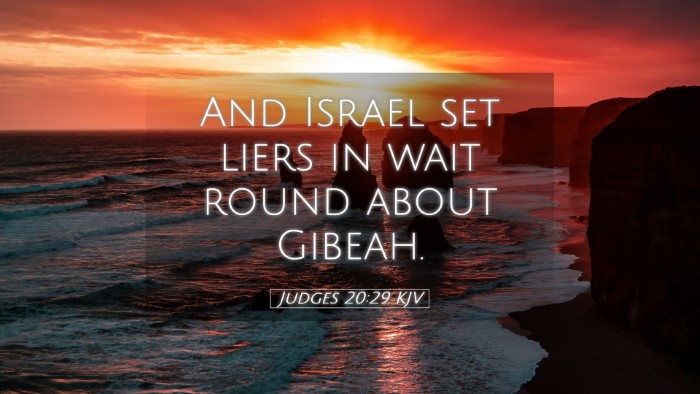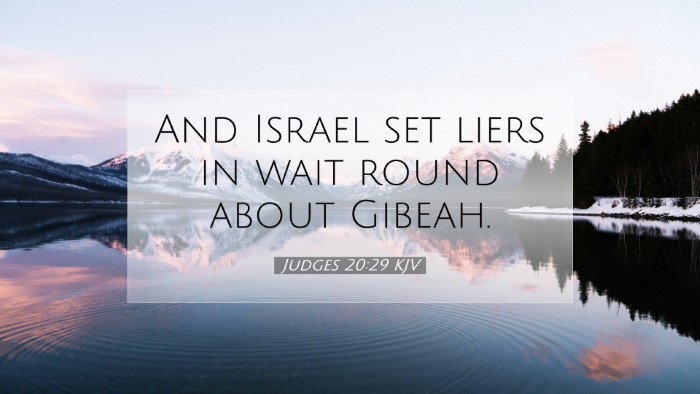Commentary on Judges 20:29
Verse Analysis: Judges 20:29 states, "And Israel set liers in wait round about Gibeah." This verse encapsulates the strategic planning of the Israelite army during a period of civil strife, leading to the conflict with the tribe of Benjamin.
Contextual Background
The backdrop of Judges 20 is sobering; it reveals a time of moral decline and chaos in Israel, marked by violence and civil discord. The Israelites were responding to the atrocious crime committed in Gibeah, a city belonging to Benjamin, which led to a call for justice among the tribes of Israel.
This passage occurs after the Levite's concubine was violated and murdered in Gibeah, prompting the Levite to rally the tribes of Israel to address the wickedness perpetrated by the Benjamites.
Strategic Warfare: Israel’s Tactical Approach
Matthew Henry highlights that the strategy involved setting "liers in wait" signifies not only a military tactic but also the serious nature of their intentions. The Israelites were determined to execute justice for the heinous crime, indicating a grave response to sin within their ranks.
Albert Barnes reflects on the notion of ambush in military tactics, noting it embodies both cunning and forethought. By surrounding their enemy, the Israelites employed a tactical advantage that would lead to decisive victory over the tribe of Benjamin.
Theological Implications
Adam Clarke emphasizes the moral aspect of warfare in this passage. It serves as a poignant reminder that justice must be meted out, especially in cases of collective sin. The Israelites weren’t just waging war; they were seeking to eradicate wickedness bubbling up from among their brethren.
Such actions raise important questions about communal responsibility in addressing sin and wrongdoing, encouraging reflection on how groups and communities confront issues of moral failure within their midst.
Lessons for Today’s Church
- Accountability: The passage encourages modern communities and churches to hold one another accountable for sin, mirroring the collective response of Israel to the transgressions they faced.
- Righteous Warfare: The commentary shows that sometimes spiritual warfare demands active measures, whether in prayer, advocacy, or communal action, to combat injustices.
- Community Cohesion: The unity displayed by the tribes of Israel in seeking justice underscores the importance of community solidarity in confronting evil.
Conclusion
Judges 20:29 exemplifies a crucial moment in Israel’s narrative, illustrating the intertwined nature of justice, sin, and communal response. Through the lenses of these public domain commentaries, we find significant insights into how this ancient text speaks anew to the realities of faith communities today. The emphasis on righteousness, strategic planning, and accountability serves as a call for both personal and corporate reflection.
As pastors, students, and theologians delve into this scripture, may they find guidance on navigating the complexities of accountability and justice in their own communities.


